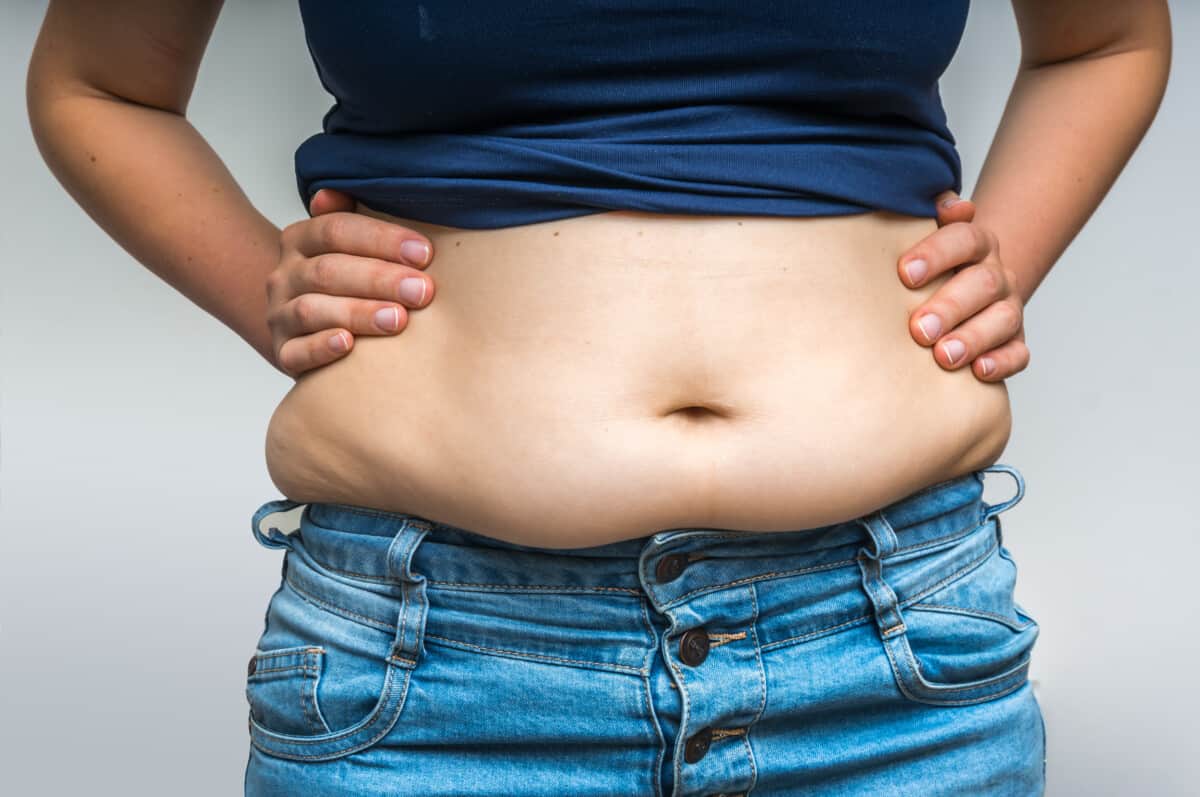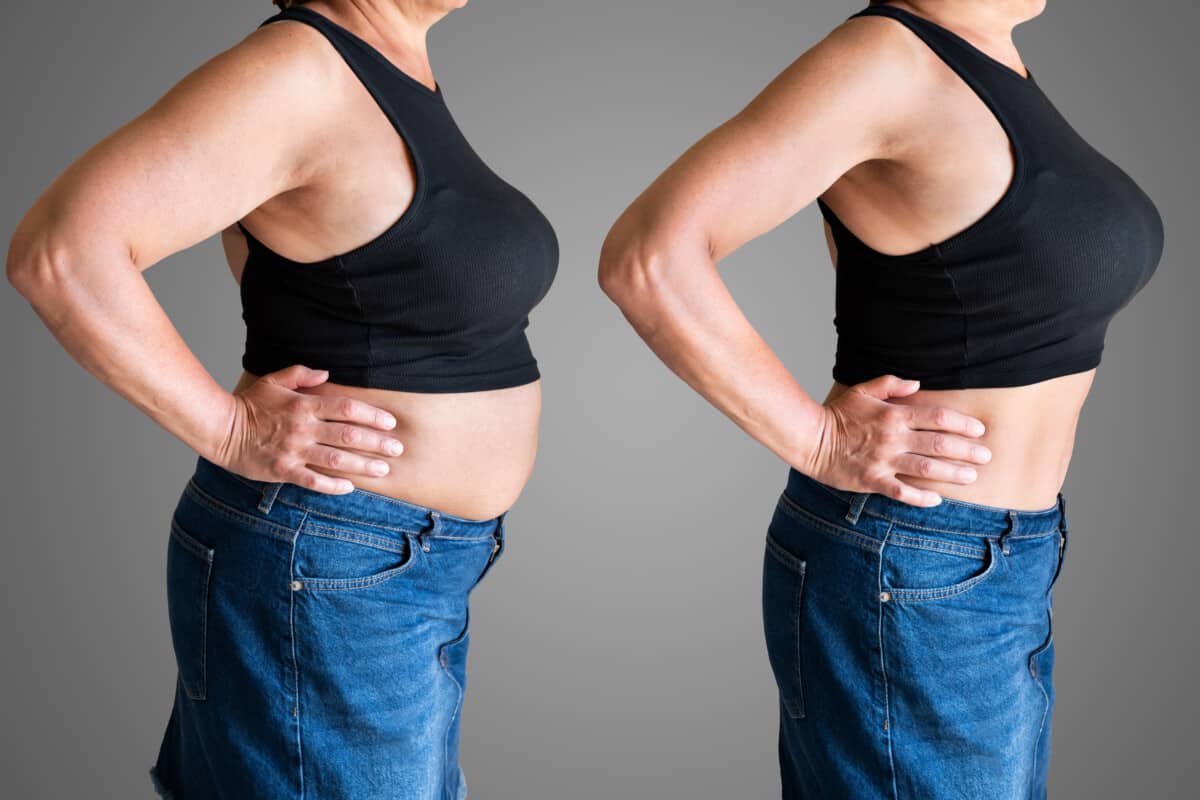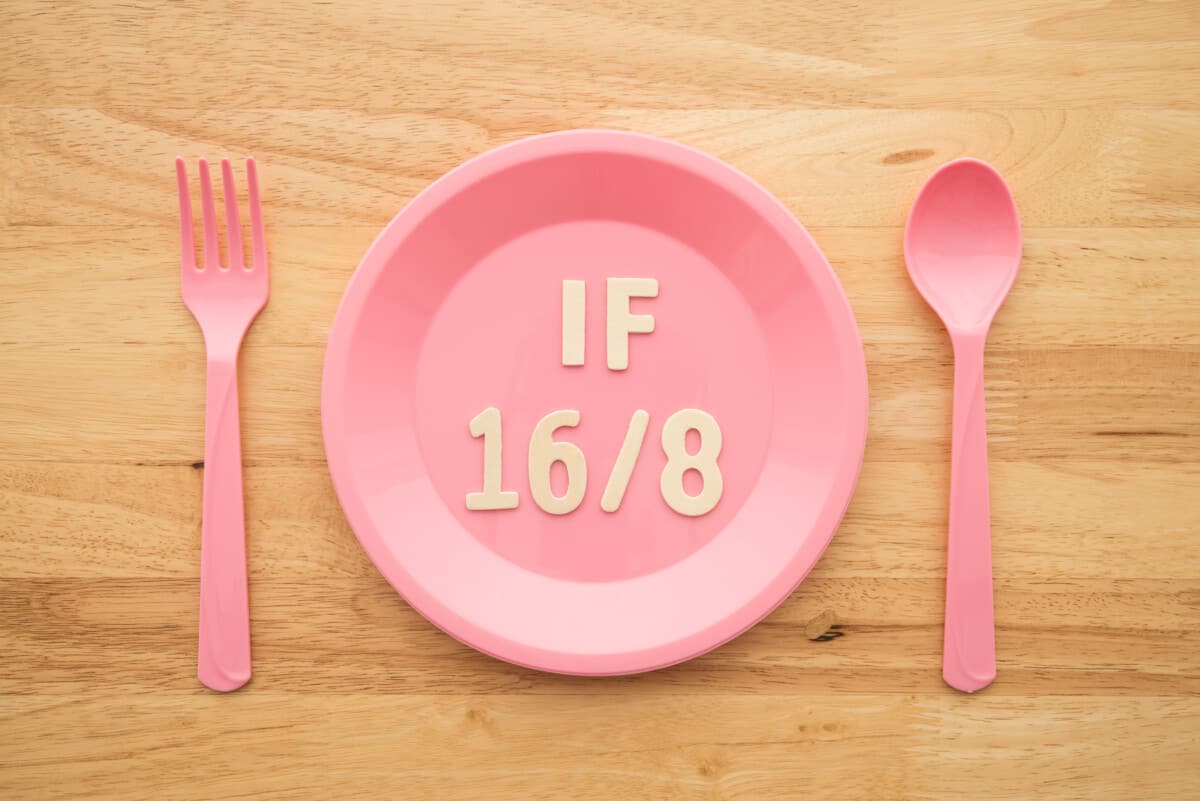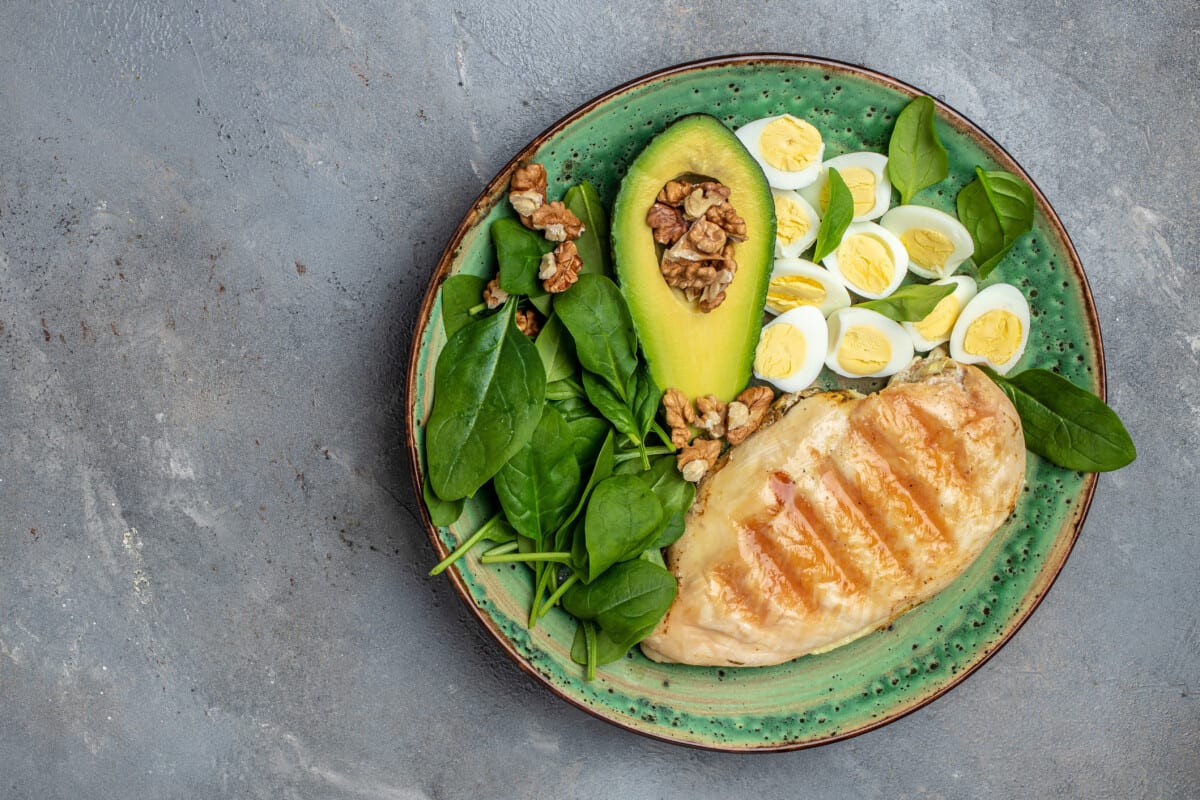The short answer is yes. Intermittent fasting has shown promise for both premenopausal and postmenopausal women.
Intermittent Fasting for Women Over 50 (Does It Work?)

If you’re a woman over 50 looking to start intermittent fasting, this is for you. Intermittent fasting has many health benefits, including weight loss, stubborn fat loss, improved mental clarity, and lower inflammation.
It seems like weight loss and your metabolism come to a grinding halt once you hit your 50s. With menopause (pre, current, post), hormonal changes make it easier to put on weight and more complicated to burn it off (1). The dreaded “menopot” is a real thing that many women struggle with.
Many women in their 50s might not have much to lose, but it becomes a struggle. Fat now distributes to other parts, creating stubborn spots like your hips, thighs, belly, arms, and neck. Loose jeans are now skin-tight. And many don’t want to have to buy another pack of “one size larger” underwear.
This blog post will discuss using intermittent fasting for women over 50 to get results. Hormonal changes that come with middle age can make it harder to lose weight, but once you start using the right strategies, it should come off fast.
Everyone knows weight loss gets more challenging when you’re older, but those no reason to feel discouraged. Start using these methods below to start dropping middle-aged spread now.
Does Intermittent Fasting Work for 50 Year Old Women?

Women in their 50s experience hormonal changes that put their bodies and if that promoting storage mode. Before, their bodies had the hormonal advantage of easily burning fat off. But the opposite happens with perimenopause, menopause, and post-menopause.
With menopause, there is a drastic decline and the sex hormones estrogen, progesterone, and testosterone. These three hormones alone have a big impact on your ability to lose and gain weight (2). As a result, you’re more likely to store weight in stubborn spots such as your belly and hips.
Estrogen and progesterone also play a significant role with your skin texture, muscle tone, and body shape (3,4). With these hormones lower in your 50s, you’ll be more likely to lose muscle and distribute fat to new stubborn spots like your hips and belly (5).
This is why it’s so hard to lose weight for women in their 50s, but not all hope is lost. So how does a 50-year-old woman drop weight when her hormones are out of whack. Women in their 50s have a complicated physiological machine they have to now work with so all conventional diets need to be thrown out the window.
Intermittent fasting is a proven and effective way for women over 50 and younger to lose stubborn weight quickly while also slowing the aging process. What dieting you once were able to use to get results most likely won’t work or be as effective as it once was. So you’re going to have to step up your game to get rid of that stubborn weight, and intermittent fasting can be the key.
Intermittent fasting is an eating pattern where you cycle between periods of eating and fasting. There are many different intermittent fasting methods, but my favorite cycles between 16-hours of fasting and 8-hours of eating. You abstain from all food and drink except water or other zero-calorie beverages during the fasting period.
Now let’s get into how you can use intermittent fasting to drop that weight gain and menopause belly fat now.
Intermittent Fasting Is Good for Women Over 50

Intermittent fasting when done correctly is more than safe for women over 50 and can produce some fantastic results. Nowadays, we’re used to having three or more meals spread throughout the day, but in reality, our ancestors could only eat sporadically. We now have the same genes but eat way more often than they did.
Nature designed your body to survive and replicate. However, food was hardly readily available for your ancestors, so their bodies had to adapt. They did this by stubbornly holding onto extra calories that could be used later in case of future famine. When food wasn’t available, their metabolisms would also slow down, keeping the weight on as long as it could (6).
With middle age, your metabolism slows down due to hormonal changes, so simply cutting calories rarely will result in weight loss. Your metabolism slows down even further because it thinks it’s in a famine. And it’s not just about the quantity of the food you’re eating but the quality.
While younger premenopausal women have to adapt their fasting due to their cycling schedule, you’ll have the advantage of consistency. Menopausal women can stick with their fasting schedule and should be able to last longer without worry.
Intermittent fasting isn’t about not eating but about eating less often. You don’t have to worry about how many calories you’re eating during your feeding window when you’re eating quality foods.
Your body is designed to fast intermittently, so start taking advantage of your ancestor’s adaptation to lose the stubborn weight.
Best Intermittent Fasting For Women Over 50

So how many hours should a 50-year-old woman do intermittent fasting?
The 16/8 method of intermittent fasting is the simplest to do and one of the most effective long-term for getting results. This fasting schedule allows you to have dinner at night and then lunch the next day. Skipping breakfast is the easiest meal to drop since most are busy in the mornings.
Women in their 50s can practice intermittent fasting more often and for longer periods than younger women since they do not have to worry about adjusting it for their monthly cycle. In addition, you can use intermittent fasting daily if your goal is to lose weight and its additional health benefits. Also, intermittent fasting helps slow the aging process by autophagy, which kills off destructive aging cells in the body (7).
If you’re new to intermittent fasting, you can start slowly with shorter fasting periods and build your way up. For example, when using intermittent fasting for women over 50, you can start on the low end for 12 to 13 hours of fasting and work your way up to 16. If you’re able to build up to 18 to 20 hours a day of fasting, that can give you some great results.
What Can You Eat When Fasting

Then the next question will be what you can eat when fasting to get the best results.
You shouldn’t be eating any food during your fasting window, but there are some beverages you can drink that won’t break your fast and can even accelerate your results. First and foremost, you make up the bulk of what you consume during your fast.
Coffee and green tea are also excellent choices since they do not contain any calories but contain caffeine and antioxidants. The two of these together can help to accelerate your metabolism, giving you better results than water alone.
Also try mixing in some C8 MCTs to your morning coffee to help fight off the hunger pains while accelerating your metabolism. They’re converted into ketones in your body which helps to signal fat burning.
Support Many of the Keto Benefits Associated With Increased Ketones, & Support Them FAST, but Without the Difficulty of Doing Keto.
- 3X Better Than Coconut Oil, Butter or MCTs
- Heightened energy levels
- Reduced cravings & appetite
- Graceful aging
- Healthy metabolism
- Increased mental clarity & focus
- Heightened physical performance and recovery

It would be best if you focused on eating quality whole foods and sticking away from processed and refined foods during your feeding window. Inflammatory foods women in their 50s should limit include gluten, dairy, grains, soy, and alcohol, but those will vary depending on the individual.
Eating more protein will be of the essence. You’re more likely to experience muscle loss with age, negatively impacting your body composition (8). Protein also makes you feel fuller longer while helping to build muscle and replace what was lost with age (9).
Consume your carbohydrates mostly from vegetables and some fruits like berries. Green leafy vegetables like spinach and kale are great choices. Healthy fats like avocados and olive oil should not be avoided since they play a vital role in losing weight and your health.
Women in their 50s will also have a harder time with insulin resistance due to hormonal changes (10). Therefore, it’s best to avoid sugar, starches, and refined carbohydrates.
The trick will be to make sure you’re not undereating, which can cause your metabolism to slow and make you feel hungrier, making it harder to fast. Then it becomes easy to overeat the next day out of hunger, putting your hormones and weight fluctuations on a roller coaster.
How Soon Before You See Results From Fasting

One of the many benefits of intermittent fasting is just how fast the results start coming in.
Your weight loss will depend on how much weight you have to lose to begin with. Women who have 30 or more pounds to lose will see the biggest results the fastest. But if you only have 5-10 pounds or so to lose, you’ll start to see the pounds coming off even after a few days of intermittent fasting.
Intermittent fasting can help promote lean muscle mass, but it’s best to add strength training to your workout routine. Muscle and bone loss accelerates for women over 50 so adding in some strength training will help you lose stubborn body fat (11).
Unfortunately, most make the mistake of just trying to lose weight but need to improve your body composition to tighten up stubborn fat spots.
Once you start losing weight you may experience some loose skin. This is because the collagen in your skin has declined such that it loses elasticity and its ability to snap back. So adding in strength training can help but it’s also a good idea to take a collagen supplement (12).
If you’re following your intermittent fasting schedule, then you’ll not only start losing weight but you’ll also have additional benefits such as:
- increased energy
- increased lean muscle mass
- reduced risk of cardiovascular disease
- lower blood pressure
- reduced stress
- strong immune system
- reduced chronic inflammation
- lower insulin levels
Restricting calories shouldn’t be focused on near as much as restricting carbohydrates. Most women over 50 get better results by cutting out the bad carbohydrates instead of calorie restriction.
FAQ
Does intermittent fasting help with belly fat?
Yes, intermittent fasting works great for losing fat on your belly because your body has to start tapping into your fat stores for energy when it’s no longer receiving food during your fasting window. I think of stomach fat as your body’s piggy bank of stored energy savings for a rainy day. It prefers to use the calories and carbohydrates you’ve just eaten for fuel instead. But since you have a restricted feeding window, your body has to turn to your stubborn fat for energy instead.
Does sleeping count as intermittent fasting?
Yes, sleeping counts as fasting since you will not be consuming any calories while you sleep unless you’re a sleep eater. This is an easy way to get a lot of hours done during your time-restricted feeding window. When you make up, skip breakfast, drink some water, and have some coffee with MCT powder instead. Then keep fasting until about lunchtime when your eating window starts.
Can I eat fruit during intermittent fasting?
It’s best to limit your fruit consumption in your feeding window even though you were intermittent fasting the rest of the time. Fruit does contain sugar in fructose, which can slow your results. A lot of this depends on your metabolic flexibility and how well your body can process the sugars in the fruit. If you have a lot of weight to lose then it’s best to limit your food consumption to low sugar berries or avocados. But if you’re fit and healthy, you can easily have some more fruit in your diet.
The Last Word
Intermittent fasting for women over 50 can be a great way to start losing weight and improving your health. You may see results fairly quickly, especially if you have a lot of weight to lose.
With your 50s comes menopause and the hormonal changes that come with it. Low estrogen, progesterone, and testosterone now make it way too easy for weight gain. Fat also begins storing in more stubborn places like your butt and hips, making it harder to fit even into your biggest jeans.
But the good news is intermittent fasting can help ‘reverse the curse’ of middle age weight gain due to menopause in women. It’ll help to improve your hormonal changes that are promoting fat storage. Plus, it’ll improve your body composition, burning off stubborn fat and giving you a great shape.
However, it’s also important to focus some on your eating habits the rest of the time. Weight loss can be harder if your calorie intake is too low since your metabolism has slowed with age. So instead, focus on eating quality foods and limiting junk food carbohydrates.
And is intermittent fasting safe? Yes, intermittent fasting for women is more than safe, and the good part of menopause is you don’t have to worry about adjusting your intermittent fasting and eating schedule to your cycle. Now it’s time to start getting some results fast.
Josh holds a Bachelor’s degree in Exercise Physiology and Nutrition Science. He’s a Certified Strength and Conditioning Specialist (CSCS) by the National Strength and Conditioning Association and he’s a Certified Personal Trainer (CPT) by American Council on Exercise. He’s worked as a Strength and Conditioning Coach at the high school and college levels. He has over 15 years of experience as a personal trainer and nutrition coach. He is also the author of The Flat Belly Formula. He strives to bring inspiration and results for people to live healthier lives through smart diet and exercise.
Intermittent Fasting for Women Over 50: 7 Tips for Success


People of all ages have been fasting since time immemorial. Our capacity to fast is fairly universal.
But that doesn’t mean intermittent fasting (IF) affects everyone equally. Today, you’ll be learning about intermittent fasting for women over 50.
Most women over 50 are wrapping up a series of hormonal changes called menopause. Combined with the natural aging process, these changes can promote increased abdominal fat, osteoporosis, accelerated muscle loss, and other troubling issues.[*]
Keep reading to learn intermittent fasting benefits, special considerations, and tips for women over 50.
What Is Intermittent Fasting?
Intermittent fasting is the practice of taking regular breaks from calories. It’s that simple.
To be considered an intermittent fast, these breaks must last anywhere from 12 to 36 hours. Anything longer is considered an extended fast.
Our ancestors practiced intermittent fasting all the time. They didn’t have a fully stocked fridge to raid when hunting and gathering failed. They had to fast.
Fortunately, they were well-adapted for this situation. While fasting, they fueled themselves with body fat.
That’s also how intermittent fasting works now. When you don’t eat, the hormone insulin stays low.[*] Low insulin, in turn, facilitates the breakdown and oxidation of body fat.
This fat-burning state drives most of the potential benefits of IF.
Benefits of IF
Weight loss is a well-documented IF benefit.[*][*] When you eat all your calories in a compressed window, you tend to eat less overall. Less overeating, less weight gain.
Beyond weight loss, intermittent fasting also:
- Promotes ketosis (ketosis may help with hunger management and mental acuity)
- Has been shown to improve cardiovascular risk markers[*][*]
- May help reverse type 2 diabetes[*][*]
- Helps enhance the circadian rhythm, your 24-hour wake-sleep cycle[*]
- Helps activate a cellular longevity program called autophagy
Let’s explore how these potential benefits might apply to women over 50.

Can IF Work for Women Over 50?
The short answer is yes. Intermittent fasting has shown promise for both premenopausal and postmenopausal women.
One study looked at alternate-day fasting (ADF) in 75 obese men and women.[*] For 12 weeks, participants ate 500 calories on fasting days and as much as they liked on non-fasting days.
Regardless of sex or menopausal status, everyone benefited on average. All groups saw similar reductions in fat mass, fasting insulin, insulin resistance, and blood pressure. Interestingly, postmenopausal women saw greater declines in LDL cholesterol (a heart disease risk factor) than premenopausal women.
Another group of researchers looked at a type of fasting called time-restricted feeding (TRF).[*] When you practice TRF, you eat all your daily calories in a compressed time frame.
In the study, obese women ate within a 4 to 6 hour feeding window for 8 weeks. For those familiar with IF protocols, this is somewhere between 16/8 and OMAD.
The results were similar to the previous study. Both pre and postmenopausal women lost weight and showed metabolic improvements.
These are desirable benefits for women over 50. Due to declines in the hormone estrogen, postmenopausal women are at higher risk for weight gain, cardiovascular disease, and blood sugar regulation issues.[*][*] More research is needed, but IF may help offset these risks.
7 Fasting Tips for Women Over 50
Ladies over 50 should consider these tips to create a sustainable IF practice.
#1: Start slow
If you’re new to intermittent fasting, start with a simple overnight fast. In other words, go from dinner to breakfast without eating.
Counting sleep, a 12-hour overnight fast requires only 4 hours of wakeful fasting. Once you’re used to overnight fasting, you can proceed with longer fasts if you like.
#2: Get enough calories
Most intermittent fasting studies allow participants to eat as much as they’d like during feeding windows.[*][*] Even with this liberal policy, most people end up eating fewer calories overall.
Too much calorie restriction is undesirable. To avoid fatigue, sleep issues, and other calorie restriction side effects, maintain a mild caloric deficit of about 10% by tracking your meals with the Carb Manager app.
#3: Prioritize protein
Inadequate protein intake accelerates age-related muscle loss. This condition (called sarcopenia) is a major cause of morbidity for older people.[*]
The more you fast, the more challenging it becomes to hit 100 grams of daily protein. (100 grams is a good target for muscle maintenance). Tracking your protein intake with Carb Manager can help.
#4: Resistance train
All forms of exercise can complement IF, but strength training is especially important. Why? Because strength training helps you maintain the lean mass (muscle) that you’d otherwise lose while fasting.[*]
Muscle keeps us functional as we age. And the older we get, the harder it is to maintain. Throw the brakes on this process by strength training and eating enough protein.
#5: Get enough electrolytes
While fasting, you lose electrolytes like sodium and potassium at higher rates.[*] To prevent the headaches, fatigue, and cramps of electrolyte deficiency, these electrolytes need to be replaced.
This means salting your food, eating electrolyte-rich foods like spinach, and possibly taking an electrolyte supplement. Check out this blog on electrolytes for more on this topic.
#6: Consider a Keto diet
Keto and intermittent fasting can be a useful tandem for women over 50. Both regimens may help lower insulin, promote ketosis, and stimulate fat loss.[*][*]
And yes, the Keto diet has been shown to help postmenopausal women lose weight.[*]
#7: Eat a nutrient-dense diet
When you practice IF, you have fewer opportunities to fuel your body with nutrients, you need to make those opportunities count.
This means eating nutrient-dense foods like meat, fish, eggs, offal, vegetables, fruits, and healthy fats. Skip the refined foods and shop the periphery of the supermarket instead.

Maintaining a Sustainable Fasting Routine
If you want to succeed with fasting, you need to make fasting part of your routine. You need to make it a habit.
One key to habit formation? Accountability.
Specifically, you want to be accountable to yourself. But how?
By measuring your progress. When you track yourself daily, your personal accountability goes through the roof.
If you haven’t tried Carb Manager yet, it’s never too late. The premium version of the app has a customized IF tracker that handles your fasting journey soup to nuts. You can also use the basic (free) version to track calories, macros, and weight. Not a bad deal for $0.
And ladies: if you’re new to fasting, you might also enjoy this comprehensive guide to IF for women.
Disclaimer: This article contains affiliate links. Carb Manager may earn a commission for qualifying purchases made through these links.






